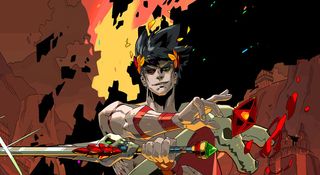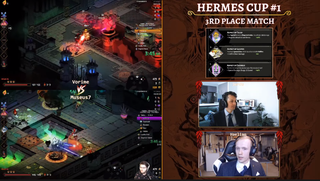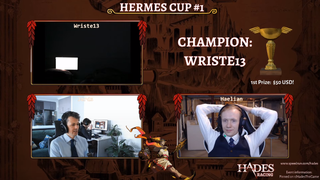Hades makes for an unlikely esport, but that hasn't stopped the Hermes Cup
A competitive roguelike? It works surprisingly well.

Raamon "Jerds" Vaccaro watches over the dueling Twitch streams of two Hades speedrunners. As always, he's dressed to the nines: a suit and tie, with a broadcaster headset nestled over his ears. This is the third race of the first ever Hermes Cup, which aired live in early August.
Both runners are equipped with the Aspect of Hades, the variant of the Eternal Spear that juices the spin attack into a vortex of damage on the battlefield, and when I start watching, they're each making mincemeat of those dastardly shieldbearers and butterfly balls in Elysium. In the next run, they will switch onto the Heart-Seeking Bow, and finally the Stygian Blade, with the goal of escaping into Greece at a faster clip than the rival across them in the bracket. If they're successful, they'll move onto the next matchup, and eventually, they'll have a chance to claim the most prized bounty in the Underworld.
Hades isn't an esport. It doesn't even have a multiplayer component. In fact, it's one of the most story-driven roguelikes of all time, and much of the game's appeal comes from the way Supergiant wraps a dynamic, engrossing narrative across the live-die-repeat formula. But with a legion of fans desperate to sink into Hades' world, writing, and airtight combat, perhaps it was only inevitable that someone like Jerds would finagle a pro league out of the pieces available. The Hermes Cup is the premiere competitive Hades speedrunning championship, and it seems to be growing more popular every day.
"[In mid-2019] I was itching to commit to a project to go all in on. I didn't know how to stream or produce video content at the time, but I had big ideas, and many forerunners in the community were supportive, had resources and were keen competitors," says Jerds about the origins of the Cup, in an interview over Discord. "So within a couple of weeks I brought together a Hermes Cup Test Run, which gave us the confidence and learnings to launch the first Hermes Cup official event in July."
Jerds knew that a straight-up, one-on-one Hades race couldn't work competitively. This game isn't Goldeneye or Banjo-Kazooie; there are two many variables in each run to throw off the balance. Instead, Jerds created a robust, almost League of Legends-like metagame around the Cup.
Each match begins with a draft, complete with picks and bans, where the two runners establish exactly what weapons they'll be using in competition. (Are you bad with the Aegis? Don't worry, you have a chance to erase it from the field before you start playing.) Players are able to choose the talents they want with Zagreus' mirror, which allows for some modulation, but both players are offered the exact same starting seed, limiting the chance a competitor will get skunked on boons and fall hopelessly behind. The Hermes Cup manages to reign in as much of the roguelike's innate randomness as possible. With all of that accounted for, Hades makes for an excellent spectator sport.
"It's addictive to watch. It's fluid. There's an excitement of understanding the creative build and the many decisions along the way. Although RNG is obviously an element in Hades, it isn't the primary factor to the success of a run," says Jerds. "There are all sorts of categories that can be raced, but I think everyone who has played the game can relate to the idea of, 'Escape as fast as possible.'"
The biggest gaming news, reviews and hardware deals
Keep up to date with the most important stories and the best deals, as picked by the PC Gamer team.

Jerds himself deserves plenty of credit for that approachability. He serves as one of the commentators on every Hermes Cup event, and it is downright illuminating to hear him annotate the quicksilver min-maxing judgement calls the average runner makes as they're literally bursting through the gates of hell.
Like plenty of Hades players, I've made it out of the underworld a handful of times, but don't have a natural feel for how, exactly, I can ensure Poseidon will offer me the package I want by the time I hit Elysium. When we watch a runner chunk down the game's final boss with an infernal blend of Zeus' lightning and purple splashes of Dionysus' hangover, it is nice to have a guide with the ability to explain, in the simplest language possible, what exactly is going on.
While The Hermes Cup might never quite rival The International or IEM Katowice, Jerds has pulled together a small prize pool to guarantee that his speedrunners have a monetary representation of their superiority—first place currently earns $100, second gets $50, and third earns $25. At the very least, it's nice to get some beer money for your prowess with the Adamant Rail.
Jerds is also producing genuine, physical "Hermes Cups"—like a Stanley Cup etched with the names of Achilles and Theseus—which we imagine will soon be regarded as the most prestigious artifact in all roguelikes. That's the goal here, to build a competitive infrastructure that will pass the test of time, long after Hades falls out of the trending page. Jerds has even welcomed a few celebrity guests into the broadcast booth. Courtney Vineys, the voice behind Dusa and Aphrodite, stopped by, which is like Tim Lincecum dropping by Oracle Park for a weekend series against the Dodgers. Anything to make the Cup feel like a celebration of the community.

The one thing Jerds can count on throughout all these efforts is support from Supergiant. The relationship between the studio and the competitive scene is remarkably solid, he says. Other speed gamers might feel ignored, or even resented, by the publishers of the games they obsess over (it is hard to imagine Nintendo ever offering any logistic assistance to those who are still blazing through Super Mario Sunshine), but Supergiant has made the promise to read everything its players have to say—from the ultra-casual, to the 1,000 hour-plus diehards. "That's an incredible amount of feedback," says Jerds. "They really care to make the best player experience they can."
These runners have all been playing this game for years. But now, after a long-awaited 1.0 release and the final chapter of this incarnation of Hades, they've made sure that they'll have something to play for till the end of time. You know, just like Zagreus.
"People are getting into speedrunning Hades at an incredible rate," says Jerds, "and I'm keen to do whatever I can to make both the community and the Cup awesome."

Luke Winkie is a freelance journalist and contributor to many publications, including PC Gamer, The New York Times, Gawker, Slate, and Mel Magazine. In between bouts of writing about Hearthstone, World of Warcraft and Twitch culture here on PC Gamer, Luke also publishes the newsletter On Posting. As a self-described "chronic poster," Luke has "spent hours deep-scrolling through surreptitious Likes tabs to uncover the root of intra-publication beef and broken down quote-tweet animosity like it’s Super Bowl tape." When he graduated from journalism school, he had no idea how bad it was going to get.
Most Popular

